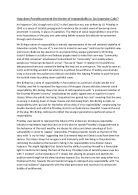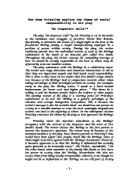Priestly uses the character Shelia to present a young capitalist changing into a young socialist. At the start Shelia say’s “you talk as if we are responsible” but after listening to the inspector and his views she realises that she was partly responsible and say’s “If I could help her now I would”. Priestly presents Shelia as intelligent. For example, she says to Eric “your squiffy” this shows she picks up that her brother has a drinking problem and her parents are oblivious to it. Shelia is a very important character because she represents Priestley’s hopes for the future generations, and that they will look after each other and accept responsibility for there actions towards each other, and not treat lower class any less then each other.
Priestly uses the character Eric to present a young capitalist changing into a socialist. Although Eric is not as intelligent as Shelia in the end he finally gets it and accepts what he has done and has learnt from his mistakes. Priestly uses Eric to relate to the audience to follow others as once Sheila started to question her parents and decide they were wrong, Eric gains the confidence to join and shows how socialism is the better option in society. The audience sees Eric’s change, from the start we can automatically tell he is very different to his father and questions his father by saying “why shouldn’t they ask for higher wages?” we can see already he is starting to feel sorry for lower class women. With the help of Shelia, he changes his attitude from seeing women as “a good sport” to accepting responsibility for his actions and what he did to make Eva commit suicide. Like Sheila at the end he questions his parents saying, “you don’t understand none of you do” Priestly does this to shows the younger generation can bring about change and although the older generation might not agree or like the idea it is the better option. Priestly makes Eric accept responsibility so the audience can see the change and relate to Eric and Shelia for the younger people in the audience.
Priestly uses the Character Gerald to represent a young capitalist who stays the same and doesn’t accept responsibility, An example of this is when he say’s “ I became the most important person in her life” and “I didn’t ask for anything in return” this shows he abused his power of being a wealthy/high class man he gave her everything when she had nothing and took it away when he got bored and wanted to go back to reality. Priestly uses Gerald to show the audience that some people don’t change and will think they did the right thing but don’t accept responsibility. The audience might think Gerald is like Shelia and Eric and will change but as soon as the inspector leaves Gerald say’s “we’ve been had” this shows the audience that even if the inspector wasn’t a real inspector he has learnt nothing and refuses to accept responsibility as Shelia and Eric don’t care who the inspector was they accepted what they did.
Priestly uses the character, Inspector Goole to show his opinions and what he would say if he was with the higher-class people like Mr Birling. The inspector is a socialist and believes “we are responsible for each other”, Priestly used the inspector to express his own opinions on capitalism and the higher class but also to bring about change by getting them to realise what they did and how they must accept responsibility. The inspector say’s “there are millions and millions of Eva Smiths and John Smiths” to get the family to realise if they make a change now and accept the responsibility they can help others in the future, however Gerald, Mr and Mrs Birling don’t agree. Just before the inspector leaves he say’s “If men will not learn that lesson they will be taught it in blood and anguish” This could be the inspector foreshadowing that a war will come and bring about change, as to Mr Birling said at the start “the Germans don’t want war” but only a few years later there was a war. The quote shows that those who don’t change with the younger generations and don’t accept reasonability will suffer consequences.
In conclusion each character has an important role in presenting responsibility, Priestly does this to possibly warn the audience what the future holds for you if you are a capitalist, or a socialist and that it is not to late to change, but if you refuse you will be punished.









